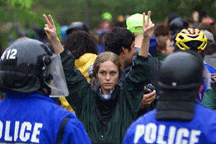
You Be The Reporter
Debunking "What You See is What You Get"
When you are encountered with an image, do you interpret it in the same way everyone else does? Reporters have the responsibility of interpreting what they see so that those who depend on them for information can interpret events for themselves. We all approach what we see with a great deal of previous experience influcencing our interpretations. These previous experiences can shape our view of any event, and cause one person to describe events in an entrily diffreent manner then someone else would. For example, a vetern of war might look very differently upon a picture of a young solider then a mother with young sons would. (work on example) The popular adage, "What you see is what you get" hold true in the sense that the individual will interpret events for themselves, however, those interpretations are formed in terms of their own experience and may differ greatly from how other might interpret events. So, what you see is not always what others will get as far as interpretation goes.
The purpose of this activity is give you a chance to interpret images as if you were the reporter covering the story in order to demonstrate that certain elements of bias are linked directly to the experiences that shape our lives. People often have very different things to say in regards to the same events, and in the case of news reporting many times the same events will be described from radically different perspectives. Take a look a the series of images below and describe what you see happening in your own words, do you think your interpretation could differ from someone else's?
Click on one of these images and give us your story...
 |
 |
 |
 |